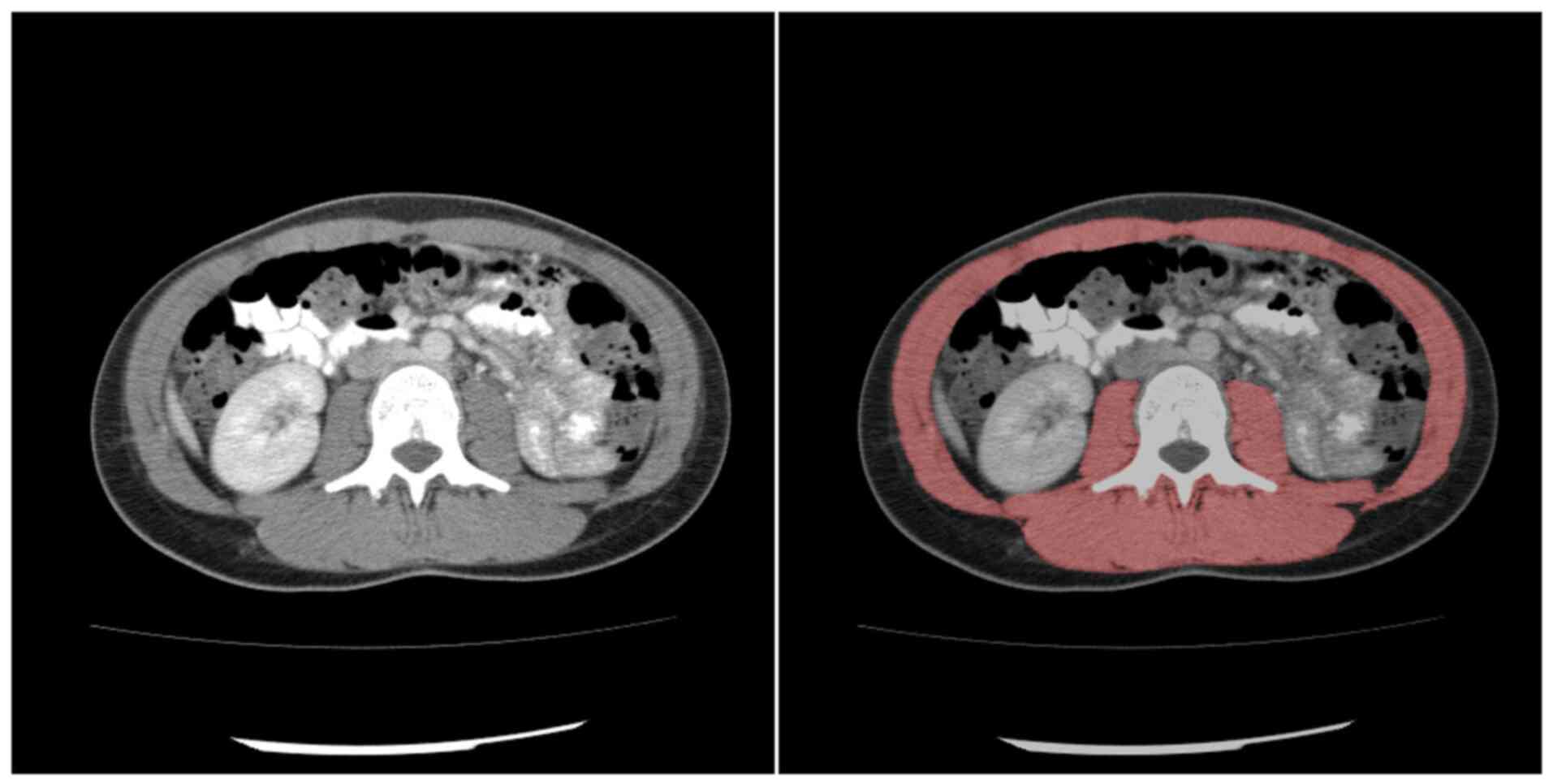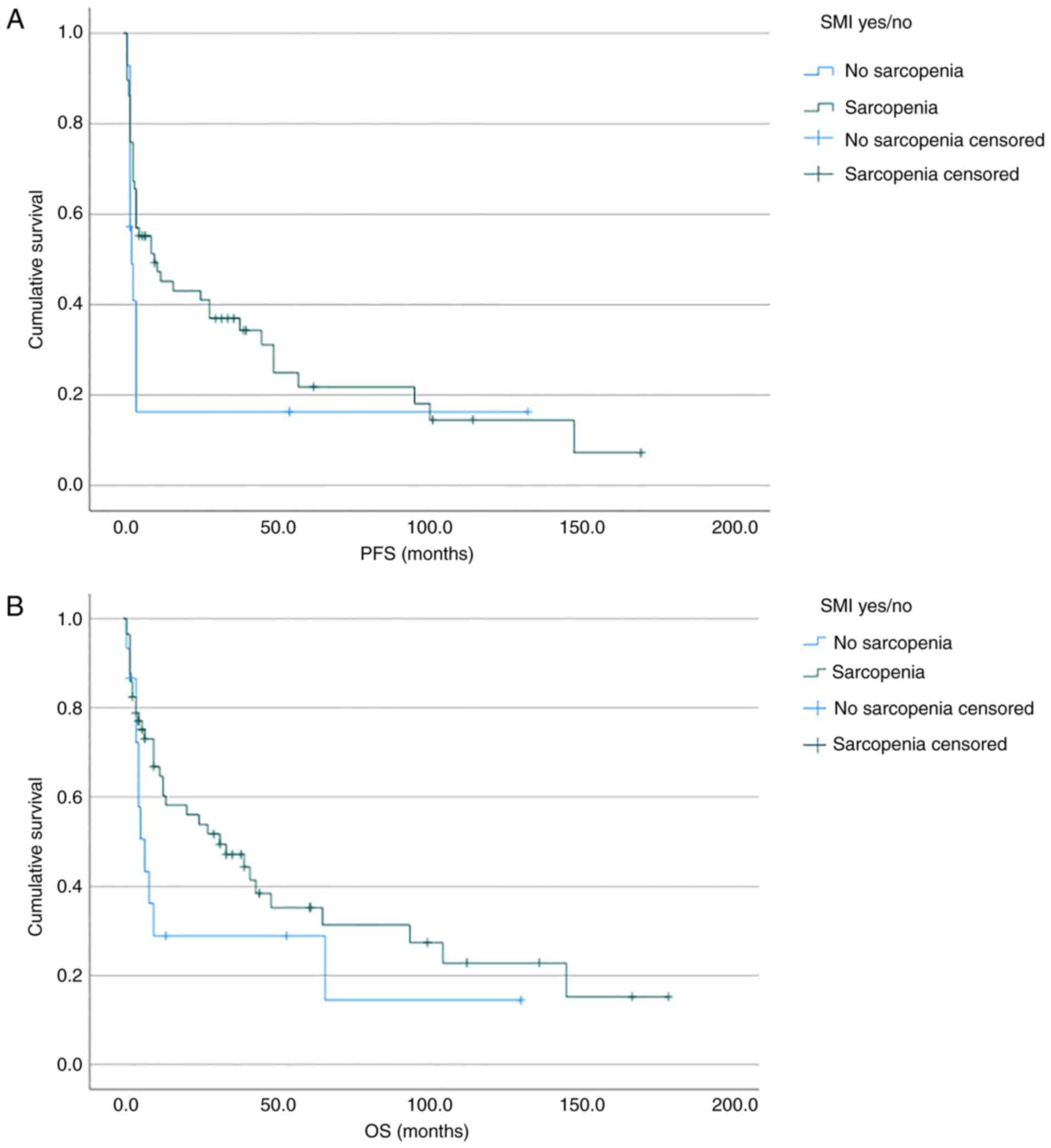|
1
|
Hoang-Xuan K, Bessell E, Bromberg J,
Hottinger AF, Preusser M, Rudà R, Schlegel U, Siegal T, Soussain C,
Abacioglu U, et al: Diagnosis and treatment of primary CNS lymphoma
in immunocompetent patients: Guidelines from the European
association for neuro-oncology. Lancet Oncol. 16:e322–e332. 2015.
View Article : Google Scholar : PubMed/NCBI
|
|
2
|
Grommes C and DeAngelis LM: Primary CNS
lymphoma. J Clin Oncol. 35:2410–2418. 2017. View Article : Google Scholar : PubMed/NCBI
|
|
3
|
Batchelor T and Loeffler JS: Primary CNS
lymphoma. J Clin Oncol. 24:1281–1288. 2006. View Article : Google Scholar : PubMed/NCBI
|
|
4
|
Villano JL, Koshy M, Shaikh H, Dolecek TA
and McCarthy BJ: Age, gender, and racial differences in incidence
and survival in primary CNS lymphoma. Br J Cancer. 105:1414–1418.
2011. View Article : Google Scholar : PubMed/NCBI
|
|
5
|
Gopal S, Patel MR, Yanik EL, Cole SR,
Achenbach CJ, Napravnik S, Burkholder GA, Reid EG, Rodriguez B,
Deeks SG, et al: Temporal trends in presentation and survival for
HIV-associated lymphoma in the antiretroviral therapy era. J Natl
Cancer Inst. 105:1221–1229. 2013. View Article : Google Scholar : PubMed/NCBI
|
|
6
|
Han CH and Batchelor TT: Diagnosis and
management of primary central nervous system lymphoma. Cancer.
123:4314–4324. 2017. View Article : Google Scholar : PubMed/NCBI
|
|
7
|
Abrey LE, Ben-Porat L, Panageas KS,
Yahalom J, Berkey B, Curran W, Schultz C, Leibel S, Nelson D, Mehta
M and DeAngelis LM: Primary central nervous system lymphoma: The
memorial sloan-kettering cancer center prognostic model. J Clin
Oncol. 24:5711–5715. 2006. View Article : Google Scholar : PubMed/NCBI
|
|
8
|
Ferreri AJM, Blay JY, Reni M, Pasini F,
Spina M, Ambrosetti A, Calderoni A, Rossi A, Vavassori V, Conconi
A, et al: Prognostic scoring system for primary CNS lymphomas: The
international extranodal lymphoma study group experience. J Clin
Oncol. 21:266–272. 2003. View Article : Google Scholar : PubMed/NCBI
|
|
9
|
Surov A and Wienke A: Sarcopenia predicts
overall survival in patients with malignant hematological diseases:
A meta-analysis. Clin Nutr. 40:1155–1160. 2021. View Article : Google Scholar : PubMed/NCBI
|
|
10
|
Kamarajah SK, Bundred J and Tan BHL: Body
composition assessment and sarcopenia in patients with gastric
cancer: A systematic review and meta-analysis. Gastric Cancer.
22:10–22. 2019. View Article : Google Scholar : PubMed/NCBI
|
|
11
|
Mintziras I, Miligkos M, Wächter S,
Manoharan J, Maurer E and Bartsch DK: Sarcopenia and sarcopenic
obesity are significantly associated with poorer overall survival
in patients with pancreatic cancer: Systematic review and
meta-analysis. Int J Surg. 59:19–26. 2018. View Article : Google Scholar : PubMed/NCBI
|
|
12
|
Sun G, Li Y, Peng Y, Lu D, Zhang F, Cui X,
Zhang Q and Li Z: Can sarcopenia be a predictor of prognosis for
patients with non-metastatic colorectal cancer? A systematic review
and meta-analysis. Int J Colorectal Dis. 33:1419–1427. 2018.
View Article : Google Scholar : PubMed/NCBI
|
|
13
|
Bak SH, Kwon SO, Han SS and Kim WJ:
Computed tomography-derived area and density of pectoralis muscle
associated disease severity and longitudinal changes in chronic
obstructive pulmonary disease: A case control study. Respir Res.
20:2262019. View Article : Google Scholar : PubMed/NCBI
|
|
14
|
Weinberg MS, Shachar SS, Muss HB, Deal AM,
Popuri K, Yu H, Nyrop KA, Alston SM and Williams GR: Beyond
sarcopenia: Characterization and integration of skeletal muscle
quantity and radiodensity in a curable breast cancer population.
Breast J. 24:278–284. 2018. View Article : Google Scholar : PubMed/NCBI
|
|
15
|
Shachar SS, Deal AM, Weinberg M, Nyrop KA,
Williams GR, Nishijima TF, Benbow JM and Muss HB: Skeletal muscle
measures as predictors of toxicity, hospitalization, and survival
in patients with metastatic breast cancer receiving taxane-based
chemotherapy. Clin Cancer Res. 23:658–665. 2017. View Article : Google Scholar : PubMed/NCBI
|
|
16
|
Karmali R, Alrifai T, Fughhi IAM, Ng R,
Chukkapalli V, Shah P, Basu S, Nathan S, Szymanski-Grant K, Gordon
LI, et al: Impact of cachexia on outcomes in aggressive lymphomas.
Ann Hematol. 96:951–956. 2017. View Article : Google Scholar : PubMed/NCBI
|
|
17
|
Camus V, Lanic H, Kraut J, Modzelewski R,
Clatot F, Picquenot JM, Contentin N, Lenain P, Groza L, Lemasle E,
et al: Prognostic impact of fat tissue loss and cachexia assessed
by computed tomography scan in elderly patients with diffuse large
B-cell lymphoma treated with immunochemotherapy. Eur J Haematol.
93:9–18. 2014. View Article : Google Scholar : PubMed/NCBI
|
|
18
|
Furtner J, Nenning KH, Roetzer T,
Gesperger J, Seebrecht L, Weber M, Grams A, Leber SL, Marhold F,
Sherif C, et al: Evaluation of the temporal muscle thickness as an
independent prognostic biomarker in patients with primary central
nervous system lymphoma. Cancers (Basel). 13:5662021. View Article : Google Scholar : PubMed/NCBI
|
|
19
|
Leone R, Sferruzza G, Calimeri T,
Steffanoni S, Conte GM, De Cobelli F, Falini A, Ferreri AJM and
Anzalone N: Quantitative muscle mass biomarkers are independent
prognosis factors in primary central nervous system lymphoma: The
role of L3-skeletal muscle index and temporal muscle thickness. Eur
J Radiol. 143:1099452021. View Article : Google Scholar : PubMed/NCBI
|
|
20
|
Prado CM, Lieffers JR, McCargar LJ, Reiman
T, Sawyer MB, Martin L and Baracos VE: Prevalence and clinical
implications of sarcopenic obesity in patients with solid tumours
of the respiratory and gastrointestinal tracts: A population-based
study. Lancet Oncol. 9:629–635. 2008. View Article : Google Scholar : PubMed/NCBI
|
|
21
|
Caram MV, Bellile EL, Englesbe MJ,
Terjimanian M, Wang SC, Griggs JJ and Couriel D: Sarcopenia is
associated with autologous transplant-related outcomes in patients
with lymphoma. Leuk Lymphoma. 56:2855–2862. 2015. View Article : Google Scholar : PubMed/NCBI
|
|
22
|
Chu MP, Lieffers J, Ghosh S, Belch A, Chua
NS, Fontaine A, Sangha R, Turner RA, Baracos VE and Sawyer MB:
Skeletal muscle density is an independent predictor of diffuse
large B-cell lymphoma outcomes treated with rituximab-based
chemoimmunotherapy. J Cachexia Sarcopenia Muscle. 8:298–304. 2017.
View Article : Google Scholar : PubMed/NCBI
|
|
23
|
Takeoka Y, Sakatoku K, Miura A, Yamamura
R, Araki T, Seura H, Okamura T, Koh H, Nakamae H, Hino M and Ohta
K: Prognostic Effect of low subcutaneous adipose tissue on survival
outcome in patients with multiple myeloma. Clin Lymphoma Myeloma
Leuk. 16:434–441. 2016. View Article : Google Scholar : PubMed/NCBI
|
|
24
|
Neto AC, Moraes BDGC, Rocha IMG, Bezerra
FA, Medeiros GOC, Alves LBO, Rossetti RAM, Fayh APT, Mariano LCB
and Rocha V: Association of sarcopenia with toxicities and survival
after autologous hematopoietic stem cell transplantation for adults
with lymphomas. Blood. 132 (Suppl 1):S21582018. View Article : Google Scholar
|
|
25
|
Zilioli VR, Albano D, Arcari A, Merli F,
Coppola A, Besutti G, Marcheselli L, Gramegna D, Muzi C, Manicone
M, et al: Clinical and prognostic role of sarcopenia in elderly
patients with classical Hodgkin lymphoma: A multicentre experience.
J Cachexia Sarcopenia Muscle. 12:1042–1055. 2021. View Article : Google Scholar : PubMed/NCBI
|
|
26
|
Au PC, Li HL, Lee GK, Li GH, Chan M,
Cheung BM, Wong IC, Lee VH, Mok J, Yip BH, et al: Sarcopenia and
mortality in cancer: A meta-analysis. Osteoporos Sarcopenia. 7
(Suppl 1):S28–S33. 2021. View Article : Google Scholar : PubMed/NCBI
|
|
27
|
Besutti G, Massaro F, Bonelli E, Braglia
L, Casali M, Versari A, Ligabue G, Pattacini P, Cavuto S, Merlo DF,
et al: Prognostic impact of muscle quantity and quality and fat
distribution in diffuse large B-cell lymphoma patients. Front Nutr.
8:6206962021. View Article : Google Scholar : PubMed/NCBI
|
|
28
|
Hacker UT, Hasenclever D, Linder N,
Stocker G, Chung HC, Kang YK, Moehler M, Busse H and Lordick F:
Prognostic role of body composition parameters in
gastric/gastroesophageal junction cancer patients from the EXPAND
trial. J Cachexia Sarcopenia Muscle. 11:135–144. 2020. View Article : Google Scholar : PubMed/NCBI
|
|
29
|
Nipp RD, Fuchs G, El-Jawahri A, Mario J,
Troschel FM, Greer JA, Gallagher ER, Jackson VA, Kambadakone A,
Hong TS, et al: Sarcopenia is associated with quality of life and
depression in patients with advanced cancer. Oncologist. 23:97–104.
2018. View Article : Google Scholar : PubMed/NCBI
|
|
30
|
Moulignier A, Lamirel C, Picard H,
Lebrette MG, Amiel C, Hamidi M, Polivka M, Mikol J, Cochereau I and
Pialoux G: Long-term AIDS-related PCNSL outcomes with HD-MTX and
combined antiretroviral therapy. Neurology. 89:796–804. 2017.
View Article : Google Scholar : PubMed/NCBI
|
|
31
|
Lin CH, Yang CF, Yang HC, Fay LY, Yeh CM,
Kuan AS, Wang HY, Gau JP, Hsiao LT, Chiou TJ, et al: Risk
prediction for early mortality in patients with newly diagnosed
primary CNS lymphoma. J Cancer. 10:39582019. View Article : Google Scholar : PubMed/NCBI
|
|
32
|
Martin L, Birdsell L, Macdonald N, Reiman
T, Clandinin MT, McCargar LJ, Murphy R, Ghosh S, Sawyer MB and
Baracos VE: Cancer cachexia in the age of obesity: Skeletal muscle
depletion is a powerful prognostic factor, independent of body mass
index. J Clin Oncol. 31:1539–1547. 2013. View Article : Google Scholar : PubMed/NCBI
|
|
33
|
Fearon K, Strasser F, Anker SD, Bosaeus I,
Bruera E, Fainsinger RL, Jatoi A, Loprinzi C, MacDonald N,
Mantovani G, et al: Definition and classification of cancer
cachexia: An international consensus. Lancet Oncol. 12:489–495.
2011. View Article : Google Scholar : PubMed/NCBI
|
|
34
|
Taguchi S, Nakagawa T and Fukuhara H:
Inconsistencies in currently used definitions of sarcopenia in
oncology. Ann Oncol. 31:318–319. 2020. View Article : Google Scholar : PubMed/NCBI
|
|
35
|
Rutten IJG, Ubachs J, Kruitwagen RFPM,
Beets-Tan RGH, Olde Damink SWM and Van Gorp T: Psoas muscle area is
not representative of total skeletal muscle area in the assessment
of sarcopenia in ovarian cancer. J Cachexia Sarcopenia Muscle.
8:630–638. 2017. View Article : Google Scholar : PubMed/NCBI
|
















